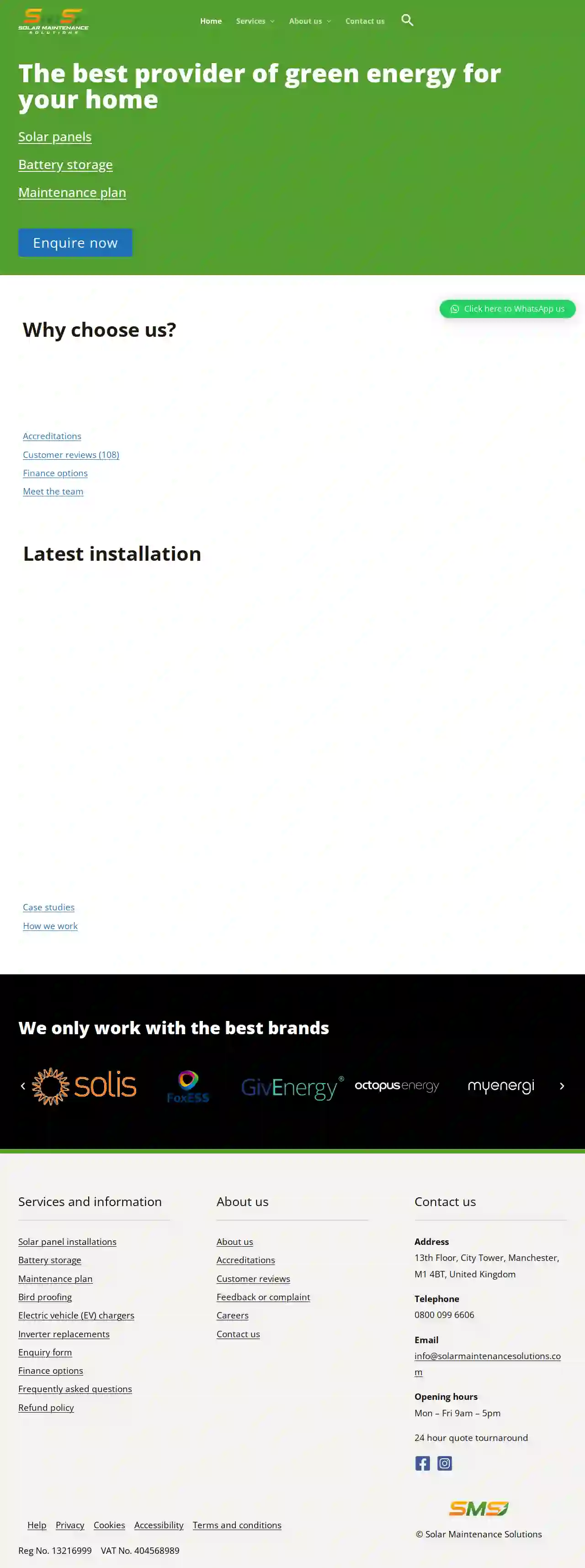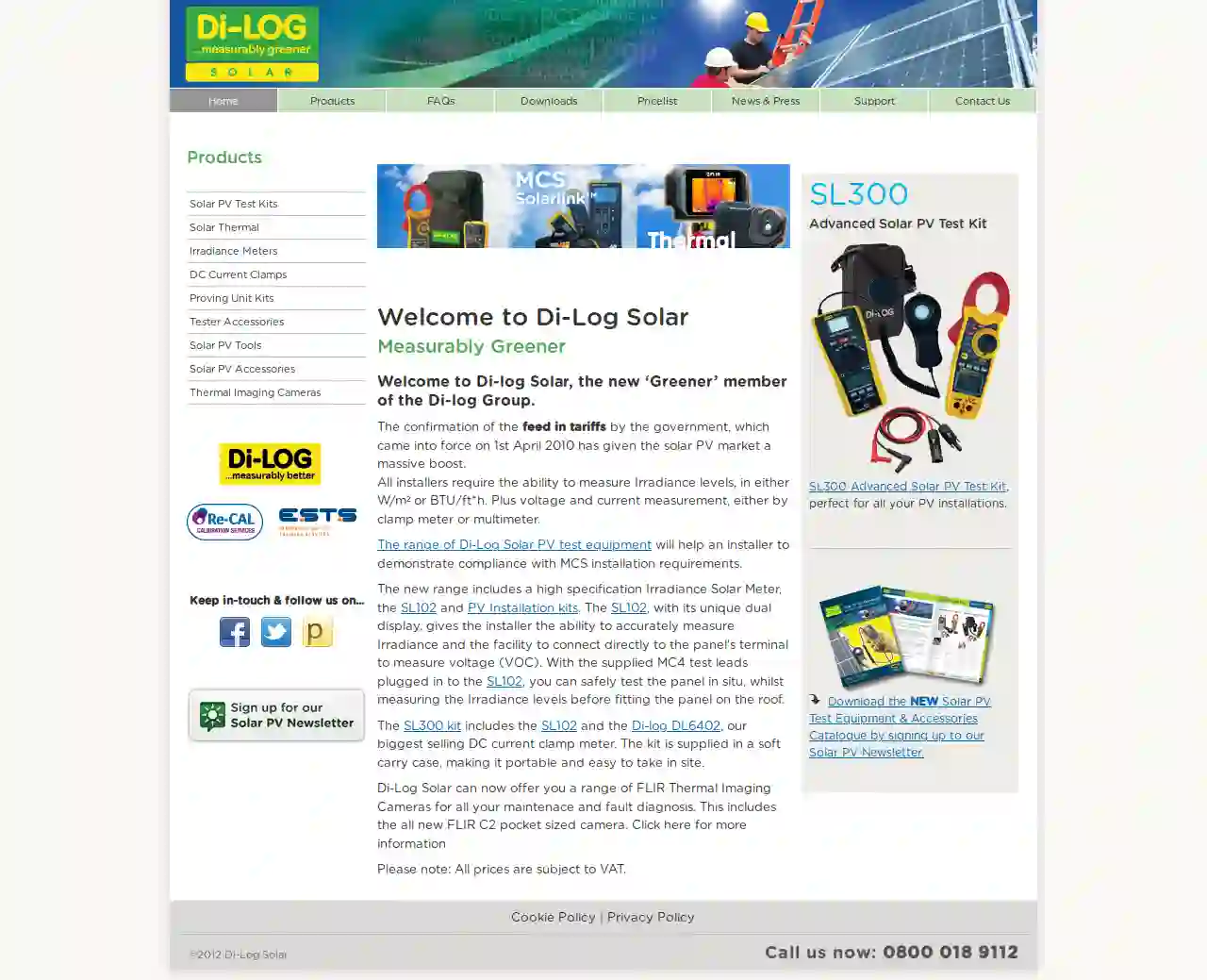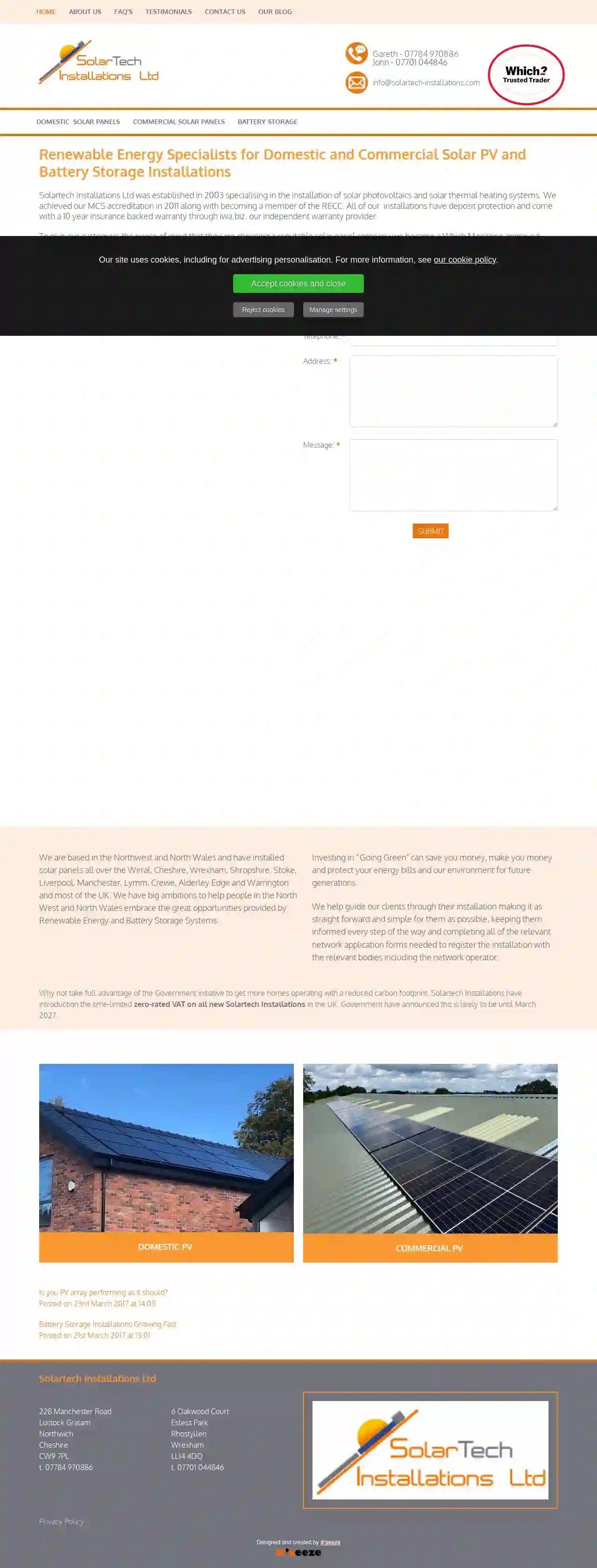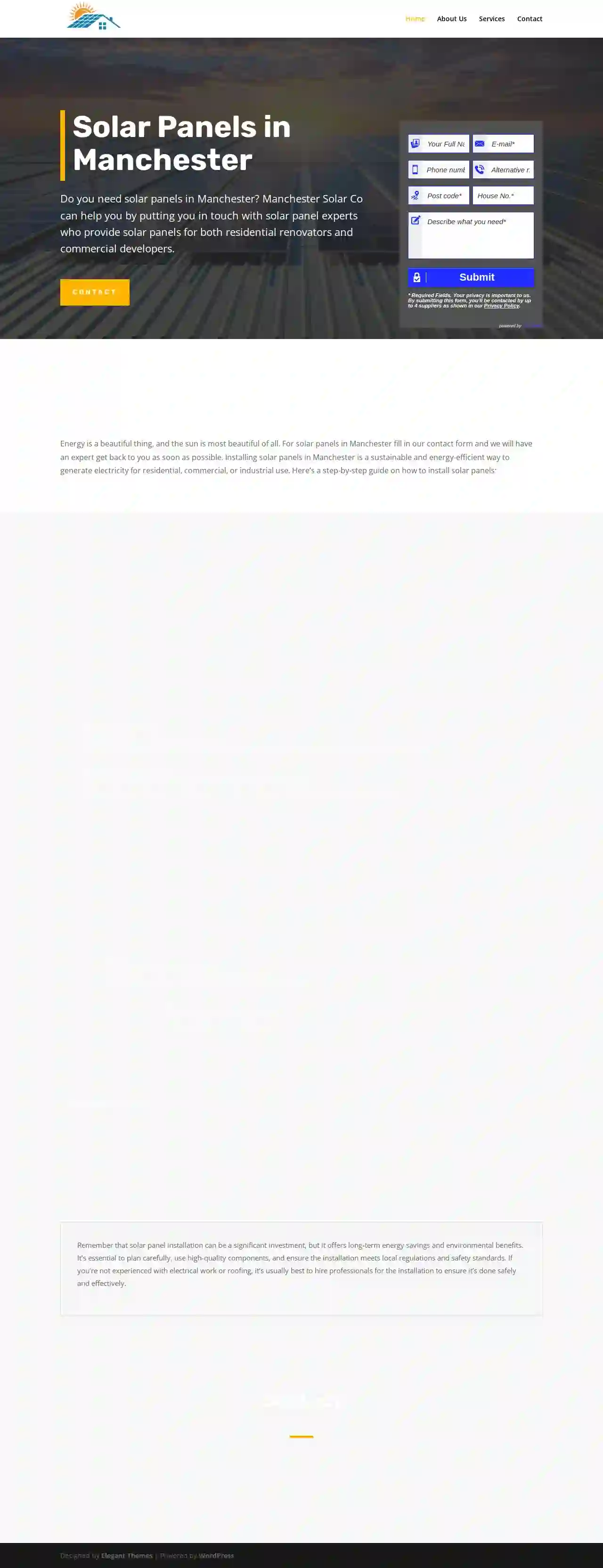Solar Installers Connahs Quay
Best Solar Companies in Connahs Quay
Get 3 FREE Solar Installers quotes for your project today! Compare profiles, reviews, accreditations, portfolio, etc... and choose the best service.

JPS Renewable Energy South West
Coldred Road, Unit 16 Wren Industrial Estate, Maidstone, ME15 9YT, GBJPS Group are a Kent based team of specialist installers of solar panel, Enphase and Tesla Powerwall systems and experienced construction experts. JPS Renewable Energy are solar panel, Enphase system and Tesla Powerwall installation specialists. Find out more. JPS Construction carry out a multitude of private and commercial projects. Find out more.
- Services
- Why Us?
- Gallery
Get Quote
NJ Solar
6 Thomas Fairfax Way, Nantwich, CW5 6YL, GBNJ Solar & Renewables is a solar installation company based in Staffordshire and Cheshire, offering a personal experience to what can be a very pushy and sales driven industry. We prioritize providing you with a great customer experience and ensuring that you receive the perfect solar energy solution for your needs. Our commitment to your satisfaction is evident in the various aspects of our service, including being fully MCS accredited, offering free advice, and providing a 25-year guarantee on our solar panels.
- Services
- Why Us?
- Accreditations
- Gallery
Get Quote
Abacus Energy Solutions Limited
58 reviewsUnit 7 Olympic Way, Sefton, L30 1RD, GBRenewable Energy Systems in the North WestWe specialise in Ground and Air Source Heat Pumps, Solar PV and Battery Storage Get In Touch Futureproof your homeCut your energy bills and switch to an efficient, green system Get In Touch Ground Source Heat Pump Air Source Heat Pump Solar PV & Battery Storage Care Plans Boiler Upgrade Scheme Why Choose Abacus Energy Solutions? Local Installers local to your area MCS accredited company Always on hand Trust Up to 12 years parts and labour warranty Thousands of happy customers 12 months workmanship warranty Services All Engineers are fully certified Rigorous quality controls on all workmanship Fully insured and registered company About Us Abacus was created in 2009 and incorporated in 2016, forming a partnership between two former Royal Naval Engineers. They continue to own and drive the company forward, instilling the core values of integrity, quality workmanship and customer excellence. Since then, we’ve grown year after year, expanding our technical teams and supporting a customer experience team to match. Our focus is renewable energy systems and they range from heat pumps to solar panels to battery storage. With the rising cost of energy, switching to one of our systems will save you money, futureproof your home and is guaranteed to be better for the environment. We believe that with over 30 years of industry experience fitting Air Source and Ground Source Heat Pumps, Solar PV and Battery Storage, we are well placed to identify and recommend systems suitable for your home or business that are high in performance and efficiency. Our highly experienced engineers are always on hand and happy to provide energy solutions to meet your needs. The selection and installation of your Energy Efficient System is just the beginning of your journey with us and our ongoing after Care Packages and service visits will certainly separate us from those ‘fit and forget’ installations. Take a look at what our customers have to say about us here on Trustpilot and our Social Media pages…
- Services
- Why Us?
- Gallery
Get Quote
Burnham and Weston Energy CIC
Burnham-on-Sea, GBBurnham and Weston Energy CIC is a local energy enterprise which generates electricity from the sun and income to support community projects in the Burnham and Weston area, support the net zero transition and help local households struggling with fuel poverty. We are a not-for-profit energy company supporting the communities of Burnham-on-Sea, Highbridge, Weston-super-Mare, and the surrounding rural area. Our solar farm at Lympsham helps us to fund local community projects, support the net zero transition and help local households struggling with fuel poverty. Request free Home Energy Saving visit. About us Burnham and Weston Energy CIC is governed by local volunteer directors. Our solar bond offer raised £4million back in 2018, and gave local people and organisations a chance to get involved as investors and shareholders. Local energy from the sun Burnham and Weston Energy CIC owns one of the largest community solar projects in the UK. We have been up and running since June 2016 and our 9.3 megawatt solar array is made up of nearly 36,000 solar panels. These panels generate electricity for the equivalent of over 2,000 homes and income from the sale of electricity and the feed-in tariff. The solar project is built on land leased from a local farming family at Wick Farm who continue to use the land for agriculture, with the added benefit of shelter for the sheep! Our project is financed by a long-term loan from Triodos Bank, an ethical bank with UK head offices in Bristol. Our solar bond offer, which raised £4million back in 2018, enabled people and organisations to invest and have a say in the governance of Burnham and Weston Energy CIC. Keep me informed Burnham & Weston Energy Sunshine FundIf you represent a local community organisation with a brilliant idea for a project that will benefit both your community and the environment, we want to hear from you. As a not-for-profit community interest company, Burnham & Weston Energy is interested in using surplus income to support local community organisations and projects. We’ve supported some amazing projects in the Highbridge, Burnham-on-Sea and Weston-super-Mare area to date. Now we want to fund more incredible projects that will make meaningful differences to their communities. Do you have a good idea that could benefit from our support? For more information and examples of projects we support, see our Grant Criteria. To submit your idea, please fill out this Application Form. Contact us Share the sunshineOur solar bond offer gave people and organisations from the local and wider community the opportunity to invest in Burnham and Weston Energy CIC, and have a say in how we are run. Our solar bond offer raised its target of £4million in 2018, making it one of the largest community energy crowd funds in the UK to date. The bonds will pay an initial interest rate of 5 per cent a year, which will rise every year with inflation. The initial investment will be repaid in installments over 18 years. Interest payments are not guaranteed and capital is at risk. The bonds are eligible to be held in a Triodos Innovative Finance ISA which allows investors to earn interest tax-free, or can be held in a self-invested pension plan (SIPP). Each bondholder was also be given a single share in Burnham and Weston Energy CIC, enabling them to take part in AGM decisions on a ‘1 member 1 vote’ basis. Power to the people! If you are one of our bondholders and your bank or contact details have changed, please change them via the Triodos Crowdfunding platform, and contact them directly if you have any queries relating to bond interest and capital payments [email protected] Find out moreWhy Burnham and Weston Energy?Our energy system is changing again. The old system of big coal and gas power stations in central locations is being replaced with a new system of smaller-scale, local generation from solar, wind and other renewable sources. Big coal and gas power stations were not always the norm – Weston’s first street lighting came from its very own Weston-super-Mare and District Gas Company, which grew to supply neighbouring towns, including Burnham. Eventually, local companies like these were nationalised, then privatised leaving communities with little power over their energy generation. With our new local energy system, there are opportunities for villages, towns and cities to go back to generating their own energy again. In doing so, energy can become a benefit rather than a burden to the local economy. Burnham and Weston Energy CIC has been set up to help the communities for Burnham and Weston take advantage of this opportunity. Meet the team Jake Burnyeat Tom Cosgrove Denys Rayner Krista Felek Angi Lewis Maria Kelly Find out more about our team Can we help you?Our solar project provides a solid foundation on which to develop a local energy enterprise with the benefit of a £10 million seed asset supporting the enterprise for the next 25+ years. Burnham & Weston Energy CIC is actively seeking to develop more initiatives that help generate energy and income for the community, and our localities to reduce their carbon emissions and achieve their net zero goals. This includes ground-mounted and rooftop solar projects, solar and heat buying clubs, community Electric Vehicle charging and helping organisations reduce their energy usage by swapping to LED lighting. We welcome interest from local organisations who would like to explore how we could help them finance energy generation or reduction projects, or have ideas for potential partnerships. Please get in touch. Join our mailing list Register your email address and name to allow us to keep you up to date with the latest news on the bond offer, community grant fund awards, general news and other community energy investment offers. By signing up you agree to be contacted by Burnham and Weston Energy and its partners about company news and industry news. To receive news about other community energy groups, sign up to our partner CFR’s mailing list. You should expect to hear from us around once a month. We will not send you any information that you have not signed up to receive or pass on your details to other third parties apart from those detailed. We take care to protect your data, for more information visit our terms and conditions. Contact usIf you have any questions or are interested in getting involved, please contact us: 01278 558370 Registered office Burnham and Weston Energy CIC, c/o Communities for Renewables CIC, Redruth House, Cornwall Business Park West, Redruth TR16 5EZ We use cookies to improve your experience. By your continued use of this site you accept such use. You can change your preferences or disable cookies from your web browser’s settings. Useful linksAnnual reports and accounts Articles of association Terms & conditions News Burnham & Highbridge Eco Festival, 1-4pm, 1st June Job opportunity: Energy Saving Programme Manager Energy and Money Saving Event in Highbridge, 2-4pm Friday 15th March Community energy links © 2018 Burnham and Weston Energy CIC All rights reserved | Registered community interest company number 10994773
- Services
- Why Us?
- Accreditations
- Our Team
- Gallery
Get Quote
Solar Maintenance Solutions
4.9114 reviews13th Floor, City Tower, Manchester, M1 4BT, GBSolar Maintenance Solutions (SMS) is a company that specializes in providing solar panels maintenance services. They understand the importance of transitioning to renewable energy sources and saw an opportunity to make a difference. They set out to revolutionise the energy industry by helping people switch to solar energy and providing the solar maintenance services people needed. SMS provides affordable solar maintenance solutions that make it easy for people to switch to solar energy. They educate people about the benefits of solar energy and show them how it can save them money in the long run. As more and more people started to switch to solar energy, the demand for SMS's solar repair and maintenance services grew. They expanded their business and hired more employees to keep up with the demand. With their maintenance solutions, they were able to ensure that solar panels worked efficiently and effectively every day of the year. This allowed communities all over the world to access and sustainable energy.
- Services
- Why Us?
- Accreditations
- Gallery
Get Quote
TRAILAR
Unit 4, Whitney Court, Hamilton Street, Oldham, OL4 1DB, GBTRAILAR was born from the idea to innovate and permanently evolve the transport industry. We fit solar mats to the roof of commercial vehicles across the globe, saving fuel, CO2 and maintenance costs for our customers. Our telematics go even further, providing data-driven opportunities to improve operational performance, with Tail Lift Counts and Battery Status reporting just a few of the benefits of our systems.
- Services
- Why Us?
- Accreditations
- Gallery
Get Quote
Di-Log Solar
Trafford Park, Manchester, 28 Wheel Forge Way, M17 1EH, GBDi-Log Solar is a new member of the Di-Log Group, specializing in 'Greener' solar solutions. The company's range of solar PV test equipment helps installers demonstrate compliance with MCS installation requirements. Their products include the SL102 Irradiance Solar Meter, which offers a unique dual display for accurate Irradiance and voltage measurement, and the SL300 kit, which combines the SL102 with the DL6402 DC current clamp meter. Di-Log Solar also offers FLIR Thermal Imaging Cameras for maintenance and fault diagnosis. All prices are subject to VAT.
- Services
- Why Us?
- Accreditations
- Gallery
Get Quote
Solartech Installations Ltd
Esless Park, Rhostyllen, 6 Oakwood Court, Wrexham, LL14 4DQ, GBRenewable Energy Specialists for Domestic and Commercial Solar PV and Battery Storage Installations. Solartech Installations Ltd was established in 2003 specialising in the installation of solar photovoltaics and solar thermal heating systems. We achieved our MCS accreditation in 2011 along with becoming a member of the RECC. All of our installations have deposit protection and come with a 10 year insurance backed warranty through iwa.biz, our independent warranty provider. To give our customers the peace of mind that they are choosing a reputable solar panel company, we became a Which Magazine approved Trusted Trader in 2014, which has proved invaluable as our customers then know that they are getting a quality installation from start to finish. We are based in the Northwest and North Wales and have installed solar panels all over the Wirral, Cheshire, Wrexham, Shropshire, Stoke, Liverpool, Manchester, Lymm, Crewe, Alderley Edge and Warrington and most of the UK. We have big ambitions to help people in the North West and North Wales embrace the great opportunities provided by Renewable Energy and Battery Storage Systems. Investing in “Going Green” can save you money, make you money and protect your energy bills and our environment for future generations. We help guide our clients through their installation, making it as straightforward and simple for them as possible, keeping them informed every step of the way and completing all of the relevant network application forms needed to register the installation with the relevant bodies, including the network operator. Why not take full advantage of the Government initiative to get more homes operating with a reduced carbon footprint? Solartech Installations have introduced the time-limited zero-rated VAT on all new Solartech Installations in the UK. Government have announced this is likely to be until March 2027.
- Services
- Why Us?
- Accreditations
- Our Team
- Testimonials
- Gallery
Get Quote
Green Energy International Limited
Chester, GBGreen Energy International Limited operates in the renewable energy market, with a successful track record in delivering solar energy & battery storage projects across the UK. As a team we have been successfully operating in the renewables market for over 10 years, developing utility scale solar PV. We locate, assess, design, and prepare the project from conception through to installation. We are proud to be helping the UK increase its renewable energy generation.
- Services
- Why Us?
- Testimonials
- Gallery
Get Quote
Blue Solar
53 reviewsChester, GBDo you need solar panels in Manchester? Manchester Solar Co can help you by putting you in touch with solar panel experts who provide solar panels for both residential renovators and commercial developers. Installing solar panels in Manchester is a sustainable and energy-efficient way to generate electricity for residential, commercial, or industrial use. Here’s a step-by-step guide on how to install solar panels: Assessment and Planning: Determine your energy needs and goals. Evaluate your location’s solar potential by considering factors like sunlight hours, shading, and roof orientation. Calculate the number of solar panels required to meet your energy needs. Check local regulations and permitting requirements for solar panel installations. Budgeting and Financing: Create a budget for your solar installation project. Explore financing options, such as loans, leases, or incentives like tax credits and rebates. Selecting Solar Panels: Choose the type of solar panels that best suit your needs (monocrystalline, polycrystalline, thin-film, etc.). Consider the efficiency, durability, and warranty of the panels. Compare prices and choose a reputable manufacturer. Hiring a Solar Installer: Decide whether to hire a professional solar installer or do it yourself (DIY). If hiring a professional, obtain multiple quotes, check references, and verify licenses and insurance. Designing the Solar System: Create a detailed solar panel layout plan for your roof or property. Determine the optimal placement and angle for the panels to maximize sunlight exposure. Permitting and Inspections: Obtain any necessary permits from local authorities. Schedule inspections as required during and after installation to ensure compliance with regulations. Acquiring Equipment and Materials: Purchase the solar panels, mounting hardware, inverters, wiring, and other necessary components. Ensure that all components are of high quality and compatible with each other. Installation: Install the mounting system on your roof or property securely. Attach the solar panels to the mounting system following the design plan. Connect the panels in an array and wire them to the inverters and electrical system. Electrical Work: Hire a licensed electrician to connect the solar system to your home’s electrical panel. Ensure the system complies with all safety codes and regulations. Testing and Commissioning: Test the system to ensure it generates electricity properly. Monitor its performance to identify and address any issues. Maintenance: Regularly clean the solar panels to remove dirt and debris that may reduce efficiency. Inspect the system for damage or wear and tear. Consider a professional inspection and maintenance service annually. Monitoring and Usage: Install a monitoring system to track your solar system’s performance and energy production. Enjoy the benefits of reduced electricity bills and a smaller carbon footprint. Remember that solar panel installation can be a significant investment, but it offers long-term energy savings and environmental benefits. It’s essential to plan carefully, use high-quality components, and ensure the installation meets local regulations and safety standards. If you’re not experienced with electrical work or roofing, it’s usually best to hire professionals for the installation to ensure it’s done safely and effectively. Some of our members have been looking for solar panels throughout Manchester for many years and their solar panel knowledge is second to none. Services are available to residential and commercial customers. Contact us today, one of our members will get back to you as soon as possible
- Services
- Why Us?
- Gallery
Get Quote
Over 3,485+ Solar Installers on our directory
Our solar companies operate in Connahs Quay and beyond!
SolarCompaniesHub has curated and vetted the Best Solar Contractors arround Connahs Quay. Find a trustworthy contractor today.
Frequently Asked Questions About Solar Installers
- Use a Directory Like SolarCompaniesHub: We connect you with pre-screened, qualified solar installers in your area.
- Check Online Reviews: Look for positive reviews on Google, Yelp, and other reputable sources.
- Ask for Referrals: Get recommendations from friends, family, or neighbors who have gone solar.
- Verify Credentials: Ensure the installer is licensed, insured, and certified by reputable organizations (e.g., NABCEP in the US).
- Get Multiple Quotes: Compare quotes from at least 3-4 installers to find the best value for your project.
- Ask Questions: Don't hesitate to ask installers about their experience, warranties, and the process they follow.
- Monocrystalline: Made from a single silicon crystal, known for high efficiency (typically 18-22%) and sleek black appearance.
- Polycrystalline: Made from multiple silicon crystals, slightly less efficient (15-17%) but often more affordable than monocrystalline.
- Thin-film: Made from thin layers of photovoltaic material, lower efficiency (8-12%) but can be flexible and lightweight.
- Contact SolarCompaniesHub: We make it simple to connect with reputable Solar Installers in your area.
- Get Free Quotes: Request free quotes from multiple installers to compare prices, systems, and warranties.
- Schedule a Site Assessment: A qualified installer will visit your property to assess your roof, energy needs, and discuss your goals.
- Review Your Proposal and Contract: Carefully review the proposed system, financing options, and warranties before signing a contract.
- Installation and Activation: Once the contract is signed, the installer will obtain necessary permits, schedule the installation, and activate your solar system.
How do I find a good solar installer near me?
What are the different types of solar panels?
Do I need to replace my roof before installing solar panels?
How do I get started with solar panel installation?
How do I find a good solar installer near me?
- Use a Directory Like SolarCompaniesHub: We connect you with pre-screened, qualified solar installers in your area.
- Check Online Reviews: Look for positive reviews on Google, Yelp, and other reputable sources.
- Ask for Referrals: Get recommendations from friends, family, or neighbors who have gone solar.
- Verify Credentials: Ensure the installer is licensed, insured, and certified by reputable organizations (e.g., NABCEP in the US).
- Get Multiple Quotes: Compare quotes from at least 3-4 installers to find the best value for your project.
- Ask Questions: Don't hesitate to ask installers about their experience, warranties, and the process they follow.
What are the different types of solar panels?
- Monocrystalline: Made from a single silicon crystal, known for high efficiency (typically 18-22%) and sleek black appearance.
- Polycrystalline: Made from multiple silicon crystals, slightly less efficient (15-17%) but often more affordable than monocrystalline.
- Thin-film: Made from thin layers of photovoltaic material, lower efficiency (8-12%) but can be flexible and lightweight.
Do I need to replace my roof before installing solar panels?
How do I get started with solar panel installation?
- Contact SolarCompaniesHub: We make it simple to connect with reputable Solar Installers in your area.
- Get Free Quotes: Request free quotes from multiple installers to compare prices, systems, and warranties.
- Schedule a Site Assessment: A qualified installer will visit your property to assess your roof, energy needs, and discuss your goals.
- Review Your Proposal and Contract: Carefully review the proposed system, financing options, and warranties before signing a contract.
- Installation and Activation: Once the contract is signed, the installer will obtain necessary permits, schedule the installation, and activate your solar system.